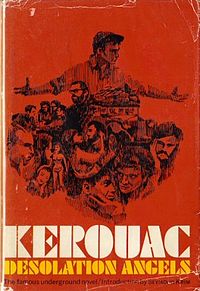- Desolation Angels (novel)
-
Desolation Angels 
1st US editionAuthor(s) Jack Kerouac Country United States Language English Series Duluoz Legend Genre(s) Novel Publisher Coward McCann Publication date 1965 Media type Print (Hardback & Paperback) Pages 366 pg ISBN NA Preceded by Visions of Gerard
(1963)Followed by Satori in Paris
(1966)Desolation Angels, published in 1965, yet written years earlier around the time On the Road was in the process of publication, is a semi-autobiographical novel written by Beat Generation author Jack Kerouac, which makes up part of his Duluoz Legend. According to the book's foreword, the opening section of the novel is almost directly taken from the journal he kept when he was a fire lookout on Desolation Peak in the North Cascade mountains of Washington state. Much of the psychological struggle which the novel's protagonist, Jack Duluoz, undergoes in the novel reflects Kerouac's own increasing disenchantment with the Buddhist philosophy with which he had previously been fascinated.
Contents
Character Key [1]
"Because of the objections of my early publishers I was not allowed to use the same personae names in each work." [2]Real-life person Character name Jack Kerouac Jack Duluoz William S. Burroughs Bull Hubbard Carolyn Cassady Evelyn Neal Cassady Cody Pomeray Gregory Corso Raphael Urso Henri Cru Deni Bleu Claude Dalenburg Paul Robert Duncan Geoffrey Donald Bill Garver Old Bull Gaines Allen Ginsberg Irwin Garden Louis Ginsberg Harry Garden Joyce Glassman Alyce Newman Randall Jarrell Varnum Random Philip Lamantia David D'Angeli Robert LaVigne Levesque Norman Mailer Harvey Marker Michael McClure Patrick McLear Locke McCorkle Kevin McLoch John Montgomery Alex Fairbrother Peter Orlovsky Simon Darlovsky Alan Watts Alex Aums Gary Snyder Jarry Wagner William Carlos Williams Dr. Williams Kerouac was not particularly conscientious about masking the identities of his friends. Partway through Chapter 91, there is this line: "'Who wants to ride freight trains!' -Gregory- 'I dont dig all this crap where you ride freight trains and have to exchange butts with bums-'" Somehow both Kerouac and the editors missed that "Gregory" was not changed to "Raphael." Similarly, the locals of Tangiers call Old Bull Hubbard, "Boorows" in Chapter 52 of Book 2, which only makes sense if you know that he is based on the real life William S. Burroughs. In Chapter 43, he refers to "...the Sundays in Neal Cassady's writings..." The editors may have ignored this since Cody is not mentioned in this context. In Part 1 of Book 2 he refers to locals calling Old Bull Gaines "Senor Gahr-va" which makes little sense unless the reader knows Gaines is based on Bill Garver. And in Chapter 80, the discussion of the meanings of Urso and Pomeray's names leads to a less than clear comparison to the name Corso.
Style
The book is broken up into two sections called Desolation Angels and Passing Through, which are then subdivided into many shorter parts. Each part focuses on a specific location where Kerouac is at that time. The first section covers Kerouac's time on the mountain and immediately after he leaves the fire lookout. The foreword of the book mentions that Kerouac was hoping to get the second section, Passing Through, published as a standalone novel.
References in popular culture
- Bad Company's 1979 album Desolation Angels was named after this novel.
- Kathy Acker's novel Kathy Goes to Haiti references this book.
- The Austin, Texas-based country band Reckless Kelly has a song titled "Desolation Angels".
- "Desolation Row", by Bob Dylan, is said to have gotten its title from this novel.
Roger Daltrey mentions the book on his solo album Parting Must be Painless on the Steve Swindells' song Dont Wait on the Stairs
- The name of alt.folk group "Mt Desolation", featuring members of The Killers, Keane, Mumford and Sons, and Noah and the Whale, is based on this book and Desolation Peak.
References
- ^ Sandison, David. Jack Kerouac: An Illustrated Biography. Chicago: Chicago Review Press. 1999
- ^ Kerouac, Jack. Visions of Cody. London and New York: Penguin Books Ltd. 1993.
- 1965. Desolation Angels
Works by Jack Kerouac Fiction The Town and the City (1950) · On the Road (1957) · The Subterraneans (1958) · The Dharma Bums (1958) · Doctor Sax (1959) · Maggie Cassidy (1959) · Book of Dreams (1960) · Tristessa (1960) · Visions of Cody (1960) · Lonesome Traveler (1960) · Big Sur (1962) · Visions of Gerard (1963) · Desolation Angels (1965) · Satori in Paris (1966) · Vanity of Duluoz (1968) · Pic (1971) · Orpheus Emerged (2002) · And the Hippos Were Boiled in Their Tanks (2008; with William S. Burroughs)Poetry Mexico City Blues (1959) · The Scripture of the Golden Eternity (1960) · Scattered Poems (1971) · Old Angel Midnight (1973) · Book of Haikus (2003) · Book of Sketches (2006)Other books Atop an Underwood: Early Stories and Other Writings (1991) · Good Blonde & Others (1993) · Beat Generation (2005)Audio Poetry for the Beat Generation (1959) · Blues and Haikus (1960) · Readings by Jack Kerouac on the Beat Generation (1960) · The Jack Kerouac Collection (1990) · Jack Kerouac Reads On the Road (1999)Bibliography · Duluoz Legend Categories:- 1965 novels
- Beat novels
- Novels by Jack Kerouac
- Novels set in Washington (state)
- 1960s novel stubs
Wikimedia Foundation. 2010.
